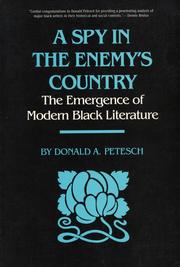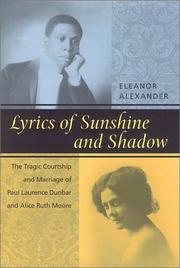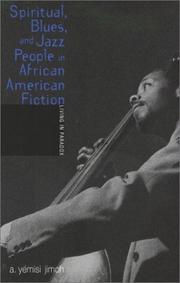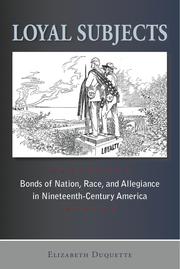| Listing 1 - 10 of 16 | << page >> |
Sort by
|

ISBN: 0870677845 Year: 1993 Publisher: Los Angeles, CA : Melrose Square,
Abstract | Keywords | Export | Availability | Bookmark
 Loading...
Loading...Choose an application
- Reference Manager
- EndNote
- RefWorks (Direct export to RefWorks)
Book
ISBN: 0805772138 Year: 1979 Publisher: Boston Twayne
Abstract | Keywords | Export | Availability | Bookmark
 Loading...
Loading...Choose an application
- Reference Manager
- EndNote
- RefWorks (Direct export to RefWorks)
Book
ISBN: 0893566519 Year: 1989 Volume: *10 Publisher: Pasadena, Calif. : Salem Press,
Abstract | Keywords | Export | Availability | Bookmark
 Loading...
Loading...Choose an application
- Reference Manager
- EndNote
- RefWorks (Direct export to RefWorks)
American poetry --- Poésie américaine --- Bibliography --- History and criticism --- Bibliographie --- Histoire et critique --- Poésie américaine --- 19th century --- Bryant, William Cullen --- Criticism and interpretation --- Emerson, Ralph Waldo --- Longfellow, Henry Wadsworth --- Whittier, John Greenleaf --- Poe, Edgar Allan --- Holmes, Oliver Wendell --- Very, Jones --- Thoreau, Henry David --- Lowell, James Russell --- Melville, Herman --- Whitman, Walt --- Tuckerman, Frederick Goddard --- Dickinson, Emily Elizabeth --- Lanier, Sidney --- Crane, Stephen --- Dunbar, Paul Laurence

ISBN: 1587291851 9781587291852 0877453225 0877452237 9780877452232 9780877453222 Year: 1989 Publisher: Iowa City, Iowa University of Iowa Press
Abstract | Keywords | Export | Availability | Bookmark
 Loading...
Loading...Choose an application
- Reference Manager
- EndNote
- RefWorks (Direct export to RefWorks)
American literature --- anno 1900-1999 --- African American authors --- History and criticism --- African Americans --- Intellectual life --- Chesnutt, Charles Waddell --- Criticism and interpretation --- Johnson, James Weldon --- Thurman, Wallace --- Larsen, Nella --- Toomer, Jean --- Thoreau, Henry David --- Ellison, Ralph Waldo --- Douglass, Frederick --- Slave narratives --- United States --- Wright, Richard --- Washington, Booker Taliaferro --- Dunbar, Paul Laurence

ISBN: 0814707556 058543459X 9780585434599 9780814706961 0814706967 9780814707555 Year: 2001 Publisher: New York New York University Press
Abstract | Keywords | Export | Availability | Bookmark
 Loading...
Loading...Choose an application
- Reference Manager
- EndNote
- RefWorks (Direct export to RefWorks)
A New York Times Notable Book of 2002! Sexism, racism, self-hatred, and romantic love: all figure in prominently in this scholarly-but nicely hard-boiled-discussion of the bond between the famous Paul Laurence Dunbar and his wife Alice. Eleanor Alexander's analysis of turn-of-the-twentieth-century black marriage is required reading for every student of American, especially African-American, heterosexual relationships."-Nell Painter, Edwards Professor of American History, Princeton University, Author of Sojourner Truth, A Life, A Symbol "Rich in documentation and generous in analysis, Lyrics of Sunshine and Shadow advances our understanding of late nineteenth- and early twentieth-century African American social and cultural history in compelling and unexpected ways. By exposing the devastating consequences of unequal power dynamics and gender relations in the union of the celebrated writers, Paul Laurence Dunbar and Alice Ruth Moore, and by examining the hidden underside of the Dunbars' storybook romance where alcohol, sex, and violence prove fatal, Eleanor Alexander produces a provocative, nuanced interpretation of late Victorian courtship and marriage, of post-emancipation racial respectability and class mobility, of pre-modern sexual rituals and color conventions in an emergent elite black society."-Thadious M. Davis, Vanderbilt University "Eleanor Alexander's vivid account of the most famous black writer of his day, Paul Laurence Dunbar, and his wife Alice, illuminates the world of the African American literati at the opening of the twentieth century. The Dunbars' fairy-tale romance ended abruptly, when Alice walked out on her alcoholic, abusive spouse. Alexander's access to scores of intimate letters and her sensitive interpretation of the Dunbars mercurial highs and lows reveal the tragic consequences of mixing alcohol, ambition and amour. The Dunbars were precursors for another doomed duo: Scott and Zelda Fitzgerald. Alexander's poignant story of the Dunbars sheds important light on love and violence among DuBois's "talented tenth." -Catherine Clinton, author of Fanny Kemble's Civil Wars "Lyrics of Sunshine and Shadow debunks Dunbar myths... Lyrics asks us to consider the ways in which racism and sexism operate together."- The CrisisOn February 10, 1906, Alice Ruth Moore, estranged wife of renowned early twentieth-century poet Paul Laurence Dunbar, boarded a streetcar, settled comfortably into her seat, and opened her newspaper to learn of her husband's death the day before. Paul Laurence Dunbar, son of former slaves, whom Frederick Douglass had dubbed "the most promising young colored man in America," was dead from tuberculosis at the age of 33. Lyrics of Sunshine and Shadow traces the tempestuous romance of America's most noted African-American literary couple. Drawing on a variety of love letters, diaries, journals, and autobiographies, Eleanor Alexander vividly recounts Dunbar's and Moore's tumultuous affair, from a courtship conducted almost entirely through letters and an elopement brought on by Dunbar's brutal, drunken rape of Moore, through their passionate marriage and its eventual violent dissolution in 1902. Moore, once having left Dunbar, rejected his every entreaty to return to him, responding to his many letters only once, with a blunt, one-word telegram ("No"). This is a remarkable story of tragic romance among African-American elites struggling to define themselves and their relationships within the context of post-slavery America. As such, it provides a timely examination of the ways in which cultural ideology and politics shape and complicate conceptions of romantic love.
African Americans --- African American authors --- Married people --- Poets, American --- Authors, American --- Authors' spouses --- Dunbar-Nelson, Alice Moore, --- Dunbar, Paul Laurence, --- Nelson, Alice Ruth Moore Dunbar, --- Dunbar, Alice, --- Dunbar, Alice Moore, --- Dunbar-Nelson, Alice, --- Nelson, Alice Moore Dunbar-, --- Moore, Alice Ruth, --- Dunbar, Paul Lawrence, --- Marriage.

ISBN: 1572331720 Year: 2002 Publisher: Knoxville University of Tennessee Press
Abstract | Keywords | Export | Availability | Bookmark
 Loading...
Loading...Choose an application
- Reference Manager
- EndNote
- RefWorks (Direct export to RefWorks)
African American musicians in literature --- Spirituals (Songs) in literature --- African Americans in literature --- Jazz musicians in literature --- Jazz in literature --- Music in literature --- Music and literature --- Blues (Music) in literature --- Thurman, Wallace --- Petry, Ann Lane --- Ellison, Ralph Waldo --- Morrison, Toni --- Murray, Albert Lee --- Wideman, John Edgar --- Hurston, Zora Neale --- Dunbar, Paul Laurence, 1872-1906. The Sport of the Gods

ISBN: 0252031946 Year: 2007 Publisher: Urbana Chicago University of Illinois Press
Abstract | Keywords | Export | Availability | Bookmark
 Loading...
Loading...Choose an application
- Reference Manager
- EndNote
- RefWorks (Direct export to RefWorks)
New York (N.Y.) in literature --- Slums in literature --- Outsiders in literature --- Campbell, Helen Stuart --- McAuley, Jerry --- Poole, Ernest --- Dunbar, Paul Laurence, 1872-1906. The Sport of the Gods --- Hapgood, Charles Hutchins --- Van Vechten, Carl --- Riis, Jacob August --- Cahan, Abraham --- McKay, Claude

ISBN: 1283383357 9786613383358 0813551129 9780813551128 9780813547817 0813547814 9780813547800 0813547806 Year: 2010 Publisher: New Brunswick, NJ
Abstract | Keywords | Export | Availability | Bookmark
 Loading...
Loading...Choose an application
- Reference Manager
- EndNote
- RefWorks (Direct export to RefWorks)
When one nation becomes two, or when two nations become one, what does national affiliation mean or require? Elizabeth Duquette answers this question by demonstrating how loyalty was used during the U.S. Civil War to define proper allegiance to the Union. For Northerners during the war, and individuals throughout the nation after Appomattox, loyalty affected the construction of national identity, moral authority, and racial characteristics. Loyal Subjects considers how the Civil War complicated the cultural value of emotion, especially the ideal of sympathy. Through an analysis of literary works written during and after the conflict-from Nathaniel Hawthorne's "Chiefly About War Matters" through Henry James's The Bostonians and Charles Chestnutt's "The Wife of His Youth," to the Pledge of Allegiance and W.E.B. Du Bois's John Brown, among many others-Duquette reveals that although American literary criticism has tended to dismiss the Civil War's impact, postwar literature was profoundly shaped by loyalty.
Nationalism and literature --- Nationalism in literature. --- Allegiance in literature. --- Loyalty in literature. --- National characteristics, American, in literature. --- American literature --- Literature and nationalism --- Literature --- History --- History and criticism. --- United States --- Literature and the war. --- 19th century --- History and criticism --- National characteristics [American ] in literature --- Allegiance in literature --- Nationalism in literature --- Civil War, 1861-1865 --- Literature and the war --- James, Henry --- Criticism and interpretation --- Chesnutt, Charles Waddell --- Du Bois, William Edward Burghardt --- Dunbar, Paul Laurence --- Phelps, Elizabeth Stuart --- Page, Thomas Nelson --- Royce, Josiah
Book
ISBN: 0870235680 9780870235689 Year: 1987 Publisher: Amherst, Mass. University of Massachusetts Press
Abstract | Keywords | Export | Availability | Bookmark
 Loading...
Loading...Choose an application
- Reference Manager
- EndNote
- RefWorks (Direct export to RefWorks)
Fiction --- American literature --- African Americans in literature --- Afro-Americans in literature --- Afro-Amerikanen in de literatuur --- Afro-Américains dans la littérature --- Amerikaanse zwarten in de literatuur --- Black Americans in literature --- Negroes in literature --- Noirs américains dans la littérature --- Zwarte Amerikanen in de literatuur --- American fiction --- African American authors --- History and criticism --- -American literature --- -History and criticism --- -African American authors --- -Afro-Americans in literature --- African Americans --- African American intellectuals --- Intellectual life --- African American authors&delete& --- Baldwin, James --- Criticism and interpretation --- Bambara, Toni Cade --- Brown, William Wells --- Chesnutt, Charles Waddell --- Cullen, Countee --- Du Bois, William Edward Burghardt --- Dunbar, Paul Laurence --- Ellison, Ralph Waldo --- Griggs, Sutton Elbert --- Himes, Chester --- Hughes, Langston --- Hurston, Zora Neale --- Kelley, William --- Killens, John Oliver --- McKay, Claude --- Major, Clarence --- Morrison, Toni --- Petry, Ann Lane --- Reed, Ishmael --- Schuyler, George Samuel --- Toomer, Jean --- Walker, Alice --- Wright, Richard --- Music [Black ] --- Walker, Alice, 1944 --- -Criticism and interpretation
Book
ISBN: 0399116028 Year: 1975 Publisher: New York, NY : G.P. Putnam's Sons,
Abstract | Keywords | Export | Availability | Bookmark
 Loading...
Loading...Choose an application
- Reference Manager
- EndNote
- RefWorks (Direct export to RefWorks)
Abolitionisten --- Abolitionists --- Abolitionnistes --- Culture orale --- Etats du Sud (Etats-Unis) dans la littérature --- Harlem Renaissance --- Mondelinge overlevering --- Mondelinge traditie --- Oral tradition --- Orale [Tradition ] --- Orale cultuur --- Oralité (Tradition) --- Southern States -- In literature --- Southern States in literature --- Tradition [Oral ] --- Tradition orale --- Tragic [The ] --- Tragiek --- Tragique [Le ] --- Tragische [Het ] --- Zuidelijke Staten (Verenigde Staten) in de literatuur --- Short stories, American --- American fiction --- Pastoral fiction, American --- Nouvelles américaines --- Roman américain --- History and criticism --- African American authors --- Histoire et critique --- Ecrivains noirs américains --- Nouvelles américaines --- Roman américain --- Ecrivains noirs américains --- Dunbar, Paul Laurence --- Criticism and interpretation --- Chesnutt, Charles Waddell --- Toomer, Jean --- Hughes, Langston --- Southern States --- Intellectual life --- 20th century --- Walrond, Eric --- Bontemps, Arna Wendell, 1902-1973 --- Slavery and slaves in literature --- 19th century --- Short stories [American ] --- Pastoral fiction [American ] --- Harlem (New York, N.Y.) --- SHORT STORIES, AMERICA --- AMERICAN FICTION --- PASTORAL FICTION, AMERICA --- AMERICAN LITERATURE --- HISTORY AND CRITICISM --- NEGRO AUTHORS --- SOUTHERN STATES
| Listing 1 - 10 of 16 | << page >> |
Sort by
|

 Search
Search Feedback
Feedback About UniCat
About UniCat  Help
Help News
News